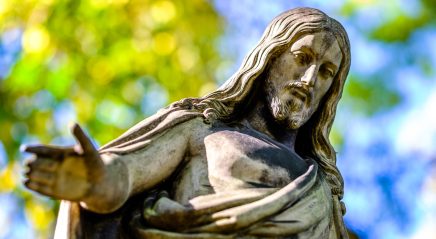Lectionary for Nov. 12, 2023
24th Sunday after Pentecost
Amos 5:18-24; Psalm 70;
1 Thessalonians 4:13-18; Matthew 25:1-13
Do you ever do things in the wrong order? I recently attended a training event at the ELCA churchwide office in Chicago and was trying to make new friends during a break at the end of a long day. Instead of starting with “Where are you from?” or “Where do you serve?” I definitely went in the wrong order and put my nerdery upfront. I asked a hyper-specific comics-related question that fell flat because I didn’t know my audience (Would anyone make a better Green Lantern than a willful 3-year-old?). Whoops! In this week’s readings, we have stories of other people who tried to put things in the wrong order with disastrous consequences.
The prophet Amos spoke to the Northern Kingdom of Israel at the height of its power. The kingdom was expanding and rich, with all signs pointing to success and blessing. There was one problem: that success was accompanied by idolatry and injustice. King Jeroboam II’s court was filled with sympathetic prophets who assured him that everything he did would prosper (including the Israelite nationalist Jonah, who resisted bringing God’s words to national rivals in Nineveh).
Yet, Amos, who insisted he wasn’t a prophet by trade, brought word to Jeroboam II that all the parties and religious feasts at idolatrous shrines that celebrated national triumphs were badly out of order. Some Israelites were looking forward to the Day of the Lord, which they believed would bring about their final victory over all the surrounding people. However, Amos foretold that the Day of the Lord would be a calamity, rather than a celebration, for those who practiced injustice and idolatry.
Instead of holding farcical celebrations that pretended to honor God while actually violating God’s worship instructions, the people should have been practicing justice and doing what is pleasing to God. The sacrifices and festivals offered at cultic sites such as Bethel (Jeroboam’s eponymous ancestor set these up specifically to prevent people from worshiping God at the temple in Jerusalem) were doubly offensive to God. Instead of integrity, they gave God idolatry. Instead of justice and righteousness, they gave God corruption and brutality.
In words later lifted up by Martin Luther King Jr., Amos demands: “But let justice roll down like waters, and righteousness like an ever-flowing stream” (5:24). The citizens of the Kingdom of Israel should have attended first to justice and righteousness. Then they could have turned to worship that would have been pleasing to God.
The oil represents deeds of justice and righteousness that God desires.
Jesus made much the same point about orderliness in righteousness and celebration in his parable of the wedding guests. He compared the kingdom of heaven to 10 young unmarried women who went to welcome an approaching groom and light his way into the marriage feast. Five of these women were wise and brought extra oil for their lamps. The other five weren’t as wise and failed to prepare their lights for a long wait. All fell asleep and later were awakened by a shout that the groom was approaching. All prepared their lamps, but half of them found that their oil was insufficient for the task of welcoming the groom. The wise women advised them to go and procure more oil, which they did. But when they returned, they found that they had missed the groom and were excluded from the feast because they weren’t recognized.
The interpretation of this parable hinges on what the oil is meant to represent. I don’t think it is “faith” here. All the women went out to wait for the groom. All made preparations (in differing amounts). All fell asleep. All woke up. The women didn’t differ in their belief that the groom would come or in their desire to celebrate his arrival. The difference was that the women had differing amounts of the substance that would light the way and welcome the groom. The oil represents deeds of justice and righteousness that God desires.
The context of Matthew 24 and 25 reaffirms this interpretation, as story after story reinforces that God desires righteous action, not just acknowledgment of Jesus as Lord. The five insufficiently prepared women should have procured “oil” of justice and righteousness before the Christ-figure returned, rather than waiting until after he arrived. They simply did things in the wrong order.
Please make no mistake, God is the author of salvation, and we do not save ourselves by our righteousness. Also, as Jesus says in John’s Gospel, branches that produce no fruit will be removed (15:5-6). We have been redeemed for a purpose. So let us respond to God’s love by producing justice and righteousness. Then we can celebrate!









